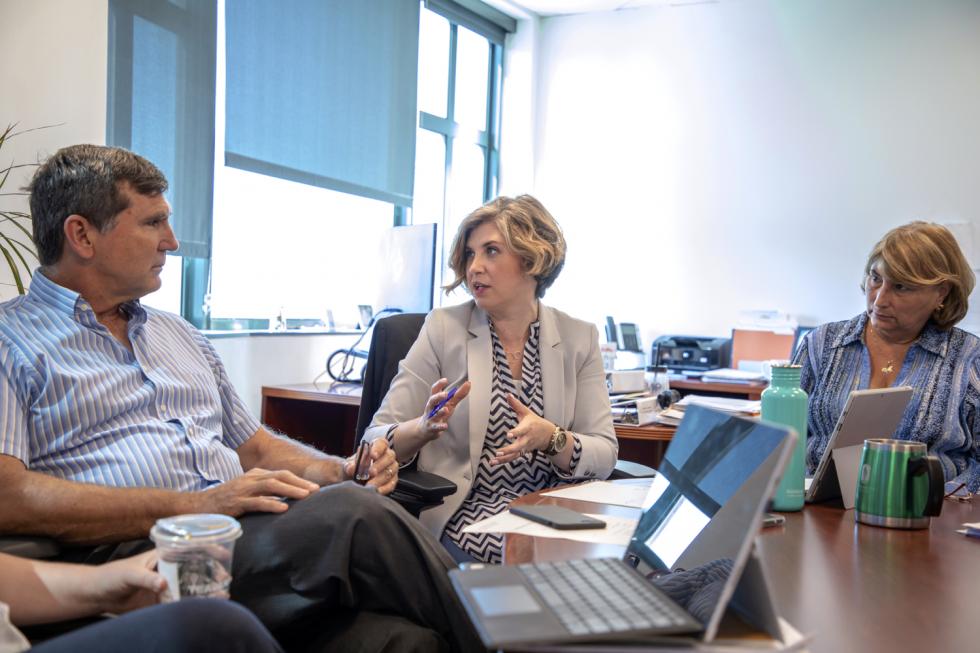Amanda Blackwood took charge of the Sacramento Metro Chamber on May 1, and immediately embarked on a 100-day plan to assess and redefine strategy.
“I don’t want to come in and say I know best,” says Blackwood, 35, who is the first woman to serve full-time as president and CEO of the business nonprofit. “I have my own ideas, but I need to understand the existing landscape.”
So she has been talking to staff, chamber members, business leaders, elected officials and others across the region. Her office walls are lined with poster-sized meeting notes, charts and colorful Post-it note ideas. Her schedule is booked solid, not just with internal meetings but with community outreach.
“It’s a new day,” Blackwood says. “Our region is experiencing a time of huge growth and prosperity. We have an opportunity to make sure it’s inclusive, and that decisions are intentional.”
Kevin Mather (left) and Gail Maciel (right) discuss an agenda
item with Amanda Blackwood during her leadership meeting.

A Kansas native, Blackwood moved to California with her family when she was 17. She graduated from Sheldon High School, enrolled in community college classes and immediately began her business career. Eighteen years later, her resume includes C-suite experience — including as chief financial officer for Folsom Asset Management and chief development officer for Elevation Entertainment Group — plus the founding of her own business consulting firm, OE Consulting.
Blackwood is also experienced on the nonprofit side, serving on the board of the Citrus Heights Chamber of Commerce, the volunteer working group of the Valley Vision Innovation Pipeline and the young professional board of the Greater Sacramento Economic Council. Perhaps her most “life-changing” professional experience, she says, was completing the Nehemiah Emerging Leadership Program in 2016.
“After going through the program, I realized it was like I had a ceiling on my achievement and I didn’t even know it,” Blackwood says.
Last November, when Peter Tateishi announced he was leaving the top spot at the Metro Chamber, colleagues immediately began calling Blackwood, urging her to apply for the position. Community leaders such as James Corless, who joined the Sacramento Area Council of Governments last year as CEO, believed Blackwood would bring dynamism to the Metro Chamber.
“She understands where we need to go economically,” Corless says. “You need someone who embodies the passion and excitement of the region, and the Chamber couldn’t have found a better candidate.”
Change was in the air — not just in Sacramento, but across the country. Corless saw it in his previous job as founding director of Transportation for America.
“For many chambers, their business model was changing dramatically,” Corless says. “Hosting networking events and golf tournaments wasn’t enough anymore. To be effective in today’s business environment, these chambers had to develop entirely new value propositions. That required dynamic executive leadership.”
Amanda Blackwood speaks to direct reports at the Sacramento Metro
Chamber.

Blackwood is the first full-time female lead in the Chamber’s 123-year history, although Martha Lofgren served in an interim role from June to December 2011. The Sacramento Metro Chamber employs 16 team members who lead eight policy teams that work on advocacy strategy for business challenges in the six-county Sacramento region. The nonprofit chamber has about 1,400 members, plus more than 600 young professionals who participate in its Metro EDGE program.
Lofgren believes Blackwood will leverage her strength in organizational management to help sharpen the Chamber’s focus.
“I think the Chamber is looking for a very strategic focus on what they do to support business,” says Lofgren, partner and cofounder of Brewer Lofgren law firm. “My crystal ball, I guess, is that will involve the Small Business Development Council, and continue to support the growth of small business. I know Amanda has interest and experience in innovation and entrepreneurial activities, and I think she probably will highlight that, which will be good for the business community.”
Also high on Blackwood’s agenda is expanding diversity at the chamber. “Our leadership needs to be diverse because our stakeholders are diverse,” Blackwood says. “We have to be intentional about it and honest about it. We have to meet the needs of all businesses. You cannot have a thriving community when chunks of your community are left behind.”
To foster a more diverse and inclusive business community, Blackwood plans to host roundtables, listening sessions and one-on-one meetings to learn what needs to be addressed in a changing economy. She would like to see more women and people of color on boards and in community leadership.
Blackwood is already sharing a “prosperity for all” message with business and civic leaders. A day before she took her new job, she served as a panelist during the daylong Regional Futures Forum, when representatives from the six-county SACOG region came together to discuss a regional development strategy.
The centerpiece of the meeting was a Brookings Metropolitan Policy Program study, which examined economic drivers and compared Sacramento to similar metropolitan areas. The report observes that Sacramento is overly dependent on government jobs, and it encourages civic and business leaders to develop in four areas: tradable industries, innovation, talent, infrastructure and governance.
The Brookings report “didn’t tell us anything we didn’t know,” Blackwood says. “But, guys, the problem doesn’t solve itself. I think our region will truly explode in prosperity when we do what we’re best at. If it’s agriculture or if it’s tech or if it’s healthcare — we have to develop what is really here, what is authentic and genuine to us. We have the pieces. We just haven’t necessarily gone through the exercise of aligning the pieces. We have to do that.”
During her first 100 days, Blackwood is already piecing together a SWOT analysis — strengths, weaknesses, opportunities and threats — for the Metro Chamber. Strengths include “123 years of amazingness” at the Chamber, plus a capable and excited team. Blackwood also senses a great deal of community support. But there are weaknesses, too.
“If we ask people, ‘What does the Chamber mean to you?’ they don’t know. Or it’s different things to different people,” Blackwood says, citing gaps with younger professional groups and entrepreneurs. “It’s essential for us as we move into the future to be able to say clearly: This is who we are and this is what we’re here to do. Our mission is to grow and retain the businesses that are already here, and we are absolutely going to do that.”
Blackwood sees unlimited opportunity — to connect people, to provide focused advocacy, to educate and solve business problems, and to involve more diverse voices in decision-making.
“Ultimately, a big threat is you can’t be all things to all people all the time,” Blackwood says. “We will be most successful when we hyper-focus our energy to the areas of greatest challenge. It’s all important work, but we have to stay focused.”
Her 100-day plan will focus on areas where the chamber can lead, influence or support other business-building work. But Blackwood will not stay in research mode indefinitely. “I am a big fan of beta tests on small scales,” she says. “Keep it lean and keep it easy. Fail fast, and then try again. And then when you have the secret sauce, launch.”




Comments
Glad to see the change. The United States Air Force sent me to the Sacramento area 1973. I saw tremendous potential with three rivers for the city to have a thriving entertainment area and the ability to attract high-tech micro electric and other technology companies. I returned to the area in in 1988 and again in 2002, unfortunately it didn't happen. Without a strong and thriving small business community to provide the ancillary services to support major corporations and the large government employment, companies continue pass on Sacramento. Small business and work force development, in my opinion, are the keys to growth.